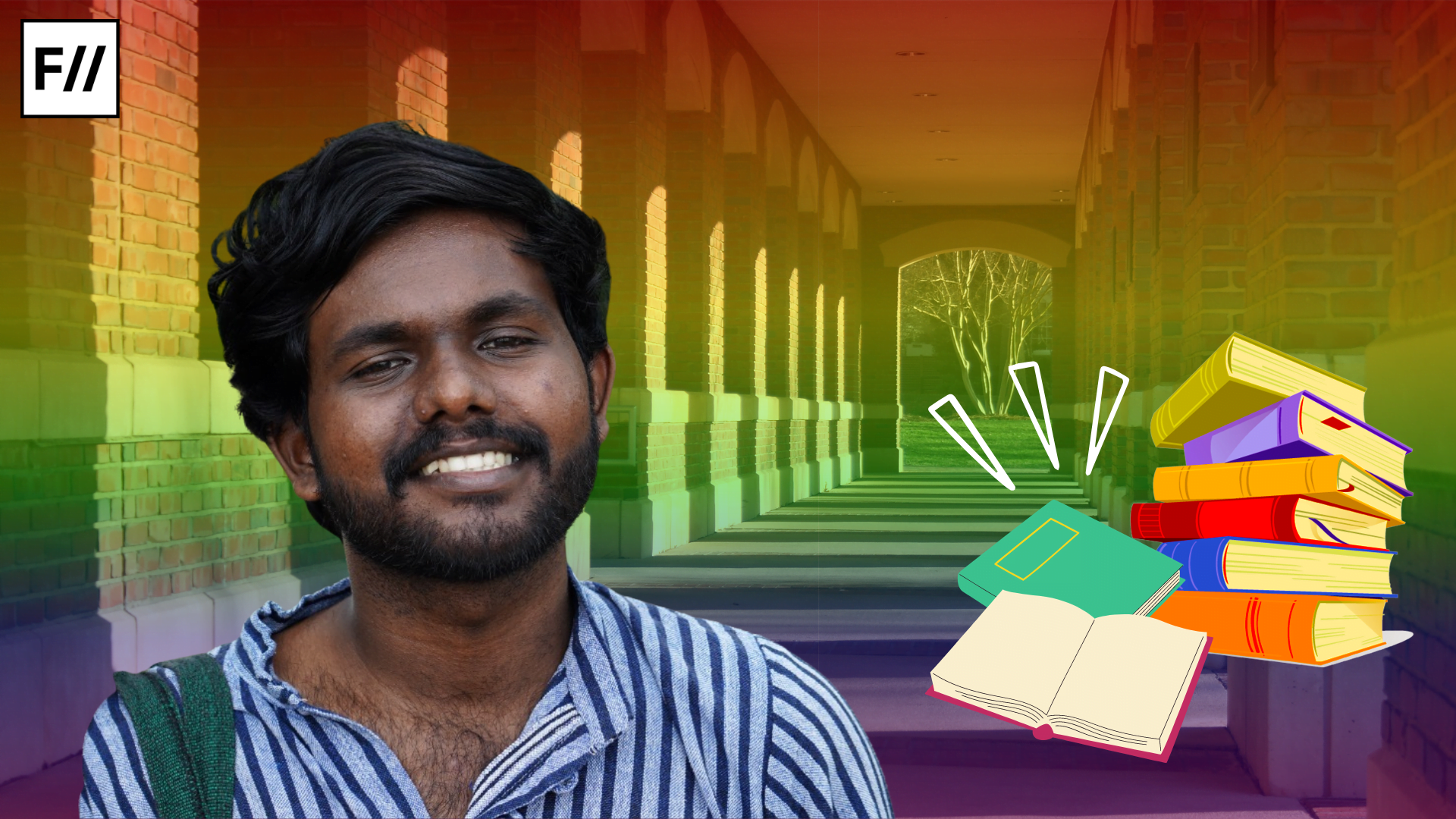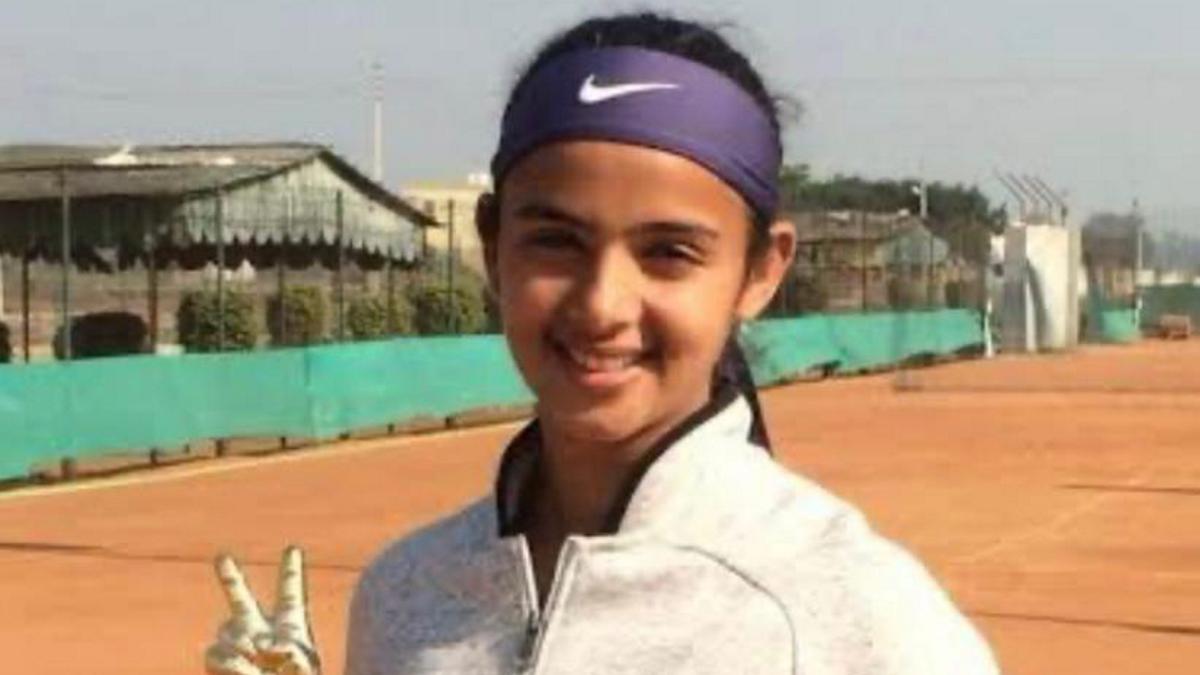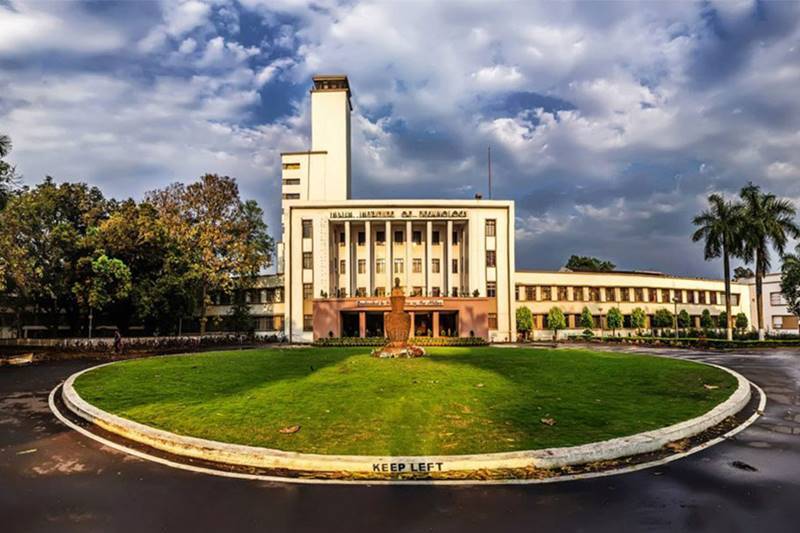Trigger Warning: Queerphobia, Violence, Caste, and Sexual Abuse
While gender neutrality and gender sensitivity are in public discussions and debates in Kerala, queerphobia is at its peak with institutional murders, lynchings and harassment making it to the news headlines almost every single day. This has been normalised for decades and it continues to question the lives and education of students like Aadi. Aadi is a Queer student from Kerala who is in a tireless fight against institutional harassment and torture that he had to experience on campus.
A B.Ed student from Kozhikode in Kerala, Aadi is a poet and writer whose poetry collections are soon to be published. With continuous torture and harassment in the B.Ed classroom, facing homophobic, moralist and casteist remarks from teachers, Aadi is questioning the oppressive system of this country that makes life difficult for marginalised communities. Aadi was and still continues to be constantly targeted for speaking against the heteronormative-queerphobic comments that the teachers are trying to preach in the four-walled classrooms.
“Fascism prevails in this college where oppositions from the student community are not welcome at all. Because of this, I never used to indulge in anything from the very beginning. Even when teachers passed inhumane comments in the classroom, I kept my mouth shut. I used to look at everyone’s face and everyone looked easy and normal. They even laugh at anti-women as well as homophobic ‘jokes’ that the teachers say. I wasn’t able to do anything and I was sure that I’ll be alone in this fight. I gave priority to my mental health and I was vulnerable at that point of time. I have been writing for a while on the discrimination that the students face in the B.Ed college, including their right to wear whatever they like. It was a later realisation, that I should deal with this legally,” says Aadi to FII.
Caste is seen and felt in various shades across India and wherever Indians exist. Caste happens within Queer communities too and this has to be acknowledged, while we talk about intersectional feminist politics in India. It’s quite disappointing to note that most of the time, the discussions on Queer community are reduced to progressive or elitist spaces where ‘caste’ is not a cup of tea for the discussants—for Queer community members and allies alike.
Also read: Claiming Spaces On Campus: Reflections Of A Transgender Student
Sulfath Laila, President of Vanaja Collective, an organisation to identify, create and establish spaces for historically oppressed communities, says “Kerala, from North to the South, has always been a place where minorities are being morally attacked, homophobia and caste discrimination exists, and people commits suicide, drop their studies halfway and even lynched to death. All this happens when the Kerala government is talking about gender-neutral uniforms and the idea of gender neutrality. I am curious to know how and when will the public consciousness change in Kerala. Of course, I believe that change is happening, it can be either through protests and long struggles or by questioning the policies that oppress us.”
“The existence of all educational institutions comes from a very easy erasure and exclusion of people belonging to the minority community. It can be people from the Dalit-Adivasi-Bahujan-Muslim-Disabled communities. It can also be women or queer people.We know people who have been excluded from educational institutions across India- Rohith Vemula and Fathima Latheef are a very few names. A Professor from Aligarh Muslim University had to commit suicide due to their sexual orientation. Hence, I have always felt a classroom as an alienated space.”
Aadi
While caste discrimination and homophobia multiply the concern and condition of the oppressed communities, it becomes not so easy to discuss queerphobia without referring to caste. Sulfath adds, “This is not the first incident in Kozhikode, nor the first in campus, there have been several reported cases of harassment for Queer community members. But for Aadi, this is a struggle for existence as he has fought caste atrocities and other difficulties that life has put on him. After proving his academic brilliance in terms of ranks and laurels, Aadi is still put into the pothole of discrimination which is intolerable. Aadi also points out that it is not just him but many female students who go through similar experiences in college but aren’t questioning or rather are afraid to question the authorities. This is not a single issue, there has been casteist, racist, homophobic mentions in various classrooms across Kerala and it’s high time we start questioning them.”
FII interviews Aadi, a fighter against casteism and queerphobia in Kerala.
Q: Can you tell us about your experience as a queer student in Kerala and the challenges you have faced?
As a queer student, I have been through a lot of problems, and have been insulted and teased by many. I have never felt included or accepted in my life. I have been subjected to bullying by teachers and students alike at school. I have been disappointed all throughout my life—I have cried a lot to which teachers usually ask me ‘Aren’t you a man, Aadi?’ Teachers have made jokes out of me saying I show effeminate characteristics. Classrooms have gifted me with heaps of trauma.
Also read: Taking Up Space: Navigating The Campus As A Disabled Woman
I had to fight and overcome these experiences in order to continue my studies. Nothing was easy for me. I was judged for my identity. And the issues I am facing right now, won’t be the last in my life. And I am not the first one to experience these. Many of my friends have dropped out of college because of similar reasons. I know so many people who have travelled the same road, who have undergone massive insult and injustice, people who have reached the front gate of a college and quit because of harassment, it’s just that I am staying back and seeking justice for the community. I have even cried and ran out of the campus after hearing homophobic comments that came from teachers in the B.Ed college. It’s easy for people to call this a dropout, but who is actually responsible for this?
Q: Have you and/or your friends done any advocacy in the college, started a group or tried talking to the administration? Was there any effort from your side to change the situation in the college?
Right from the very beginning, there used to be transphobic and homophobic comments coming from the professors. There are 55 students in the class coming from various backgrounds, and the majority of them lack awareness when it comes to these kinds of issues. I have revealed my identity in many situations to my friends and we used to discuss and talk about gender and sexuality openly. They lack awareness of this and I tried to educate them. But when the teachers come to the class and make false facts saying, being a homosexual or transgender is a disease and needs medical attention, this brings a lot of confusion and misunderstanding among the students. This can lead to a lot of judgments about me. They have kept on saying that being a gender minority or homosexual is a disease while they know that someone in their own class is a Queer student. I used to skip classes in the first semester because I had no idea what should be done.
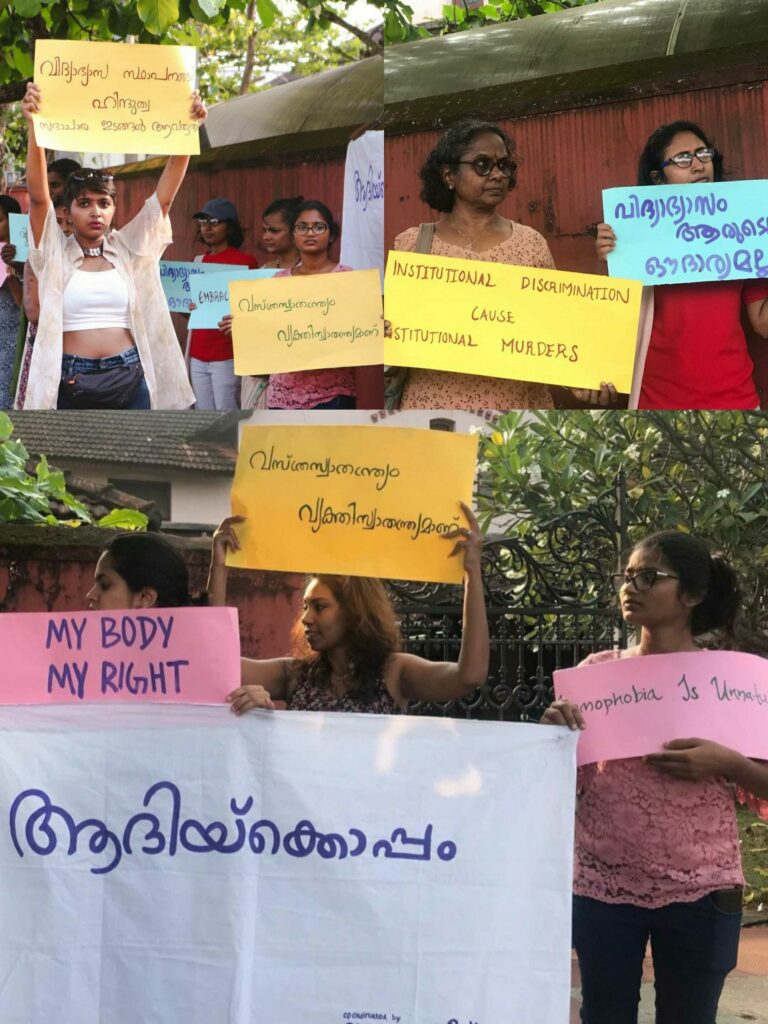
It was in the month of June 2022, the same professor insulted me for my way of dressing. I later came to know that these professors are talking to students regarding my dressing style and identity. From then onwards, everyone gave me an awkward stare as if I were an alien creature, this triggered me and I realised that I should start calling out these people. Although I spoke to the principal regarding this, I was hopeless in the way he dealt with this issue. Happened in one of the next few days, a student publicly insulted me and my way of dressing at the college event through a microphone.
Later in the evening, this issue was reported to the Minister for Higher Education, Kerala Government. I never thought of making a controversy in Kerala, but this was out of my hands when again in the month of September this professor said hateful speech against me. He said that I was ruining the reputation of the college, I am writing nonsense and which soap will I use to remove this dirt and so on. I wrote a detailed letter to the principal and as usual, this was not given any consideration or clarification.
My complaint wasn’t considered in the ICC, instead, it was taken to the GRC. As per the UGC regulations, there should be an ICC in every higher educational institution (which is also gender neutral), I even doubt if there is an ICC in this college. I was denied justice. As usual, the GRC enquired about this issue and favoured the professors in their final report.
I have filed an official complaint and reported this issue to the UGC, Human Rights Commission and the Higher Education Department. I hope that justice will be served.
Q: Institutional Queerphobia is not new in India. Institutions acting against gender, religious, and caste minorities aren’t new here and institutional murders have been normalised. How do you feel when places you should feel safe, happy and inspiring turn out to be against your identity, belief system and existence?
For a person, who is experiencing oppression in different shades, what really is a safe space? Where are we safe in fact? People from my community are killed in houses, streets and even educational institutions. Dalit-Women-Queer-Muslim-Disabled communities are going through a systemic exclusion in our society. My experiences have taught me that even classrooms aren’t inclusive.
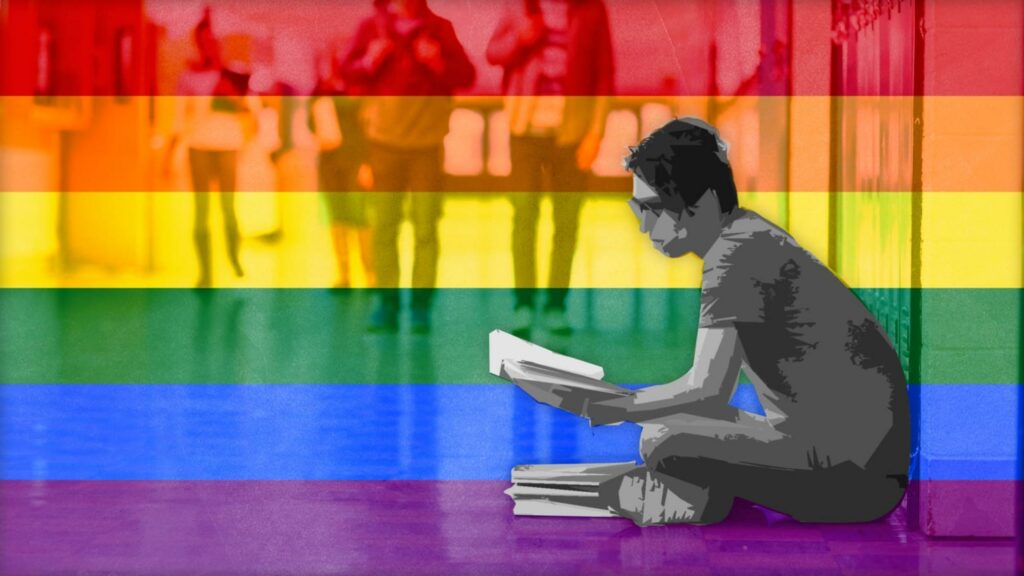
The existence of all educational institutions comes from a very easy erasure and exclusion of people belonging to the minority community. It can be people from the Dalit-Adivasi-Bahujan-Muslim-Disabled communities. It can also be women or queer people. We know people who have been excluded from educational institutions across India—Rohith Vemula and Fathima Latheef are very few names. A Professor from Aligarh Muslim University died by suicide because of homophobic harassment. Hence, I have always felt a classroom is an alienated space.
“I am a Queer student. You don’t have any rights to ask me to shut up and sit when I face harassment and torture in this institution.”
Aadi
I am studying in a Government College in Kerala and even then I had to go through such bleak situations. When it was intolerable for me, I had to complain about the harassment and discrimination from professors, and what I got as a response was ‘Why do people like you come to study? Should the world change for you?’— These are the questions they ask me. After quite a big struggle and hard work, I received university rank for both my bachelor’s and master and then I took admission here. This is not easy and affordable for somebody like me, who comes from a marginalised background. I am not asking them for any kind of sympathy or help. I am talking about my own rights and freedom and I’ll keep talking about this unless and until the justice is served.
Q: In one of your interviews, you mentioned a professor who said children shouldn’t apply make-up, since that can attract paedophiles. Don’t you think this is the larger part of the problem where the survivors are shamed and the oppressed are more tortured than the oppressor?
Yes. That’s just one example. The kind of things I had to hear from professors are quite disturbing. Teachers often leave heinous remarks and comments in the classroom. No student ever dared to question this attitude. B.Ed classrooms are the most apolitical spaces you will ever see. The majority of the students here are the ones who care only for themselves and remain in their safe spaces. The professors here are hypocrites who take classes on gender neutrality outside and talk the opposite inside. We can’t narrow down this issue to a particular person or educational institution, there is no use in punishing one or two individuals for this rather this is a larger problem that needs attention and this has become a part of the normalised public consciousness. This consciousness comes from and is rooted in the brahmanical heteronormative patriarchy. Our silences often cater to the growth of this consciousness. It’s not people, rather systems are the culprits here.
Q: Your studies might have been affected in the last few months by the recent developments in B.Ed college, I am wondering how was your school days. How did you get along with the toxic environment in Kerala that constantly runs behind gender and caste minorities?
My school days weren’t good at all. I have never felt included and that has put me inferior most of the time. I did my Master’s at Sree Sankaracharya Sanskrit University, Kalady, which is a politically vibrant campus and I had a lot of learnings from that space. The B.Ed Campus is where I encountered a lot of homophobic comments right from the first semester. I had even run from classrooms due to the same reason. Most days, I had to kill time in the library.
Also read: Anupama & Deepa P Mohanan’s Cases: The Intersectionality Crisis In Kerala’s Left Politics
A teacher insulted me publicly and this was followed by a 45-minute meeting in the principal’s office where I said, ‘If this turns out to be a controversy, let it be. The problem is when we start normalising these issues. You are excluding queer students like me and this is a problem. Basically, you are taking away my right to education and this cannot be tolerated in a democratic space. As I said, nobody is going to question this, nobody will, and if I continue doing this I might be dropped out of this institution. I never use to attend classes of those homophobic-queerphobic teachers, if at I fail in these subjects, who will take the responsibility? This should be addressed and not ignored. Imagine if a student had to undergo sexual abuse on this campus by a teacher, will you ask her/him/they to shut their mouth and sit as it will affect the reputation of the campus? No right. I am a queer student. You don’t have any right to ask me to shut up and sit when I face harassment and torture in this institution!’
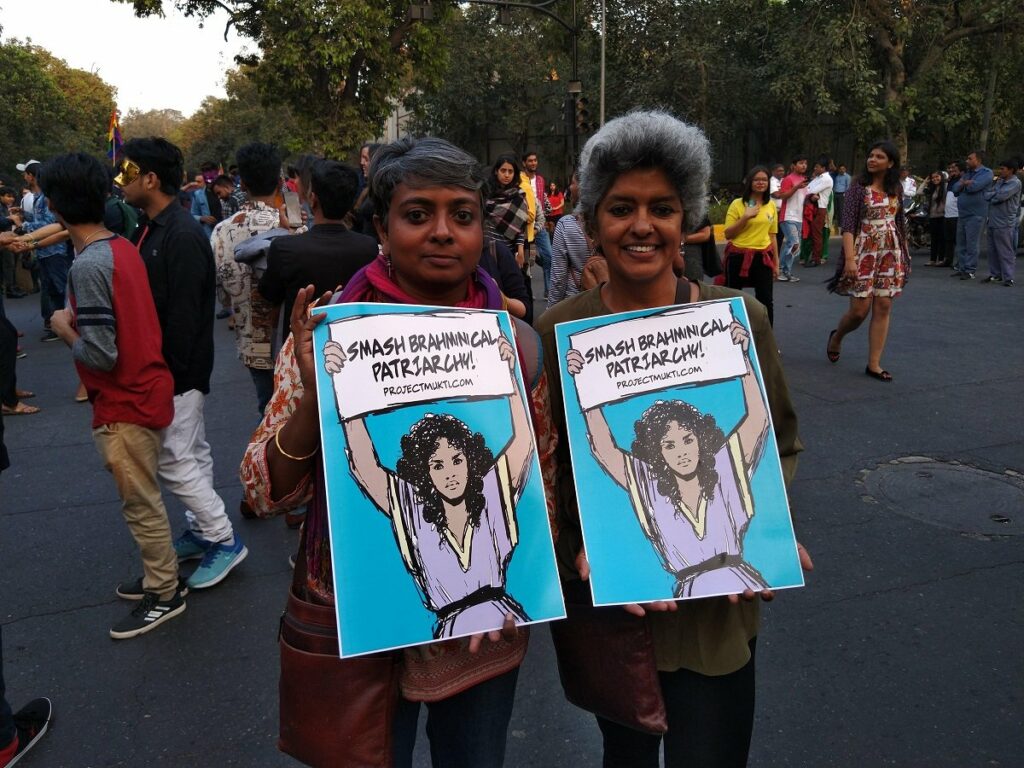
Even in the midst of hundreds of problems, the only happiness I have or achieved is when I realise that I have fought back against this oppressive system, from a child who cries at every unwanted stare and who believed in ‘this is what we deserve’ I have grown so much.
Q: There are honour killings and lynchings happening in South India. Being someone from an oppressed caste and gender, the risk and cost of life doubles. When you came out, did you get enough support from your close ones?
I really don’t know how to answer this question, I haven’t come out to my family. When I say or write about this on social media, people used to get shocked, since I am a very visible queer activist/person in public life. Coming out is not an easy task. I still remember the matrimony advertisement that appeared in The Hindu by Harish Iyer’s mother, Padma Iyer, which reads like this- ‘Groom required. This is for my son. Caste is not a problem. We are more than happy if it’s Iyer.’ There is a visible and invisible gap between Padma Iyer and my mother. Privilege and Caste are two relevant concerns here. I am really not sure how I should speak to my mother regarding this, who goes for a daily wage job that pays her Rupees 300 per day. We have bigger problems in life and I think coming out is for the privileged ones and everyone cannot do that. I am happy that I am at least genuine to myself.
Q: With numerous positive stories coming from the LGBT+ community in Kerala, do you believe it’s all changing slowly?
How do we define ‘change’? For me, it’s a radical process. I believe in a radical change where the oppressed communities benefit from all privileges that this society can ensure and not the emancipation of a single person. I have trans friends who do beggary and sex work for a living. The kind of violence my friends had to undergo every night is intolerable. My friend, Anand, has a big wound scar from the forehead to the neck, which is a reflection of this transphobic society. So please don’t lie to me by saying that Kerala has changed. What I understand is there are intellectual discussions on queer and LGBT+ happening in Kerala, other than that it’s the same old belief system that exists here.
“Queer discussions are placed within a progressive-essentialist space. There is a larger problem in that discourse. Queer discussions are human rights issues and not progressive issues. When queer issues are seen as progressive concerns, caste and religion become invisible in that discourse. This reduces queer discussions into mere Savarna issues.”
Aadi
Although Kerala has trans policies to its credit, is there any change in the behaviour of the policemen towards transpersons? Aren’t they killed even today?
Also read: 6 Landmark Moments Of Campus Resistance In 2021
So basically there should be a structural change which cannot be met with any tricks or short-term plans. With struggles, protests, discussions and organisations, we might be able to break this chain. The kind of queer discussions happening in Kerala is quite different and I have spoken about this in various interviews. First of all, queer discussions are placed within a progressive-essentialist space. There is a larger problem in that discourse. Queer discussions are human rights issues and not progressive issues. When queer issues are seen as progressive concerns, caste and religion become invisible in that discourse. This reduces queer discussions into mere Savarna issues.
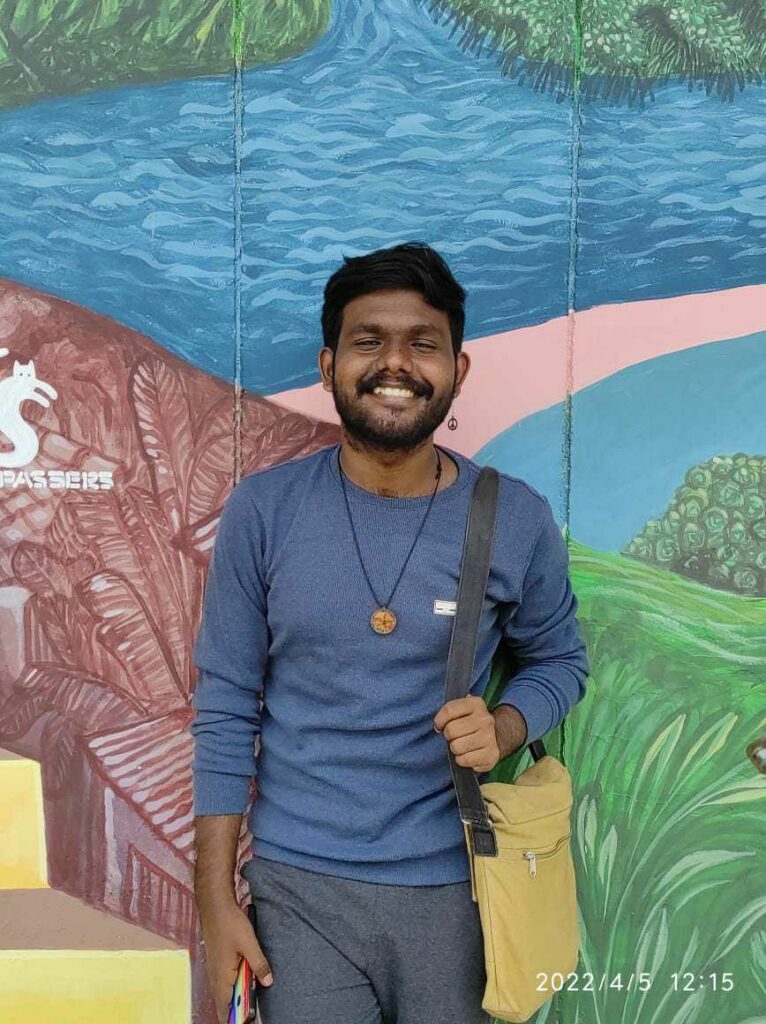
It’s quite easy to analyse Kerala as a developed space for queer communities by analysing the progressive discussions on social media. There is a larger gap between the progressiveness these people serve on social media and the people I meet on a very regular basis. It’s in the same ‘developed’ Kerala, I was harassed in an educational institution and my right to education was denied. Ananya, Anjana and Sridhanya lived in the same Kerala. Hence, please don’t lie to me saying Kerala has changed.
Kerala might have changed but not for people like me. We are still trapped in this systemic oppression.
The interview was carried out in Malayalam and has been translated and paraphrased at the interviewer’s discretion.
FII thanks Aadi for the time and effort. You can follow him on Instagram.
About the author(s)
Rohini did her Masters in English from Jamia Millia Islamia, New Delhi. Beyond her passion for music, she writes about performing arts in socio-cultural contexts. An ardent fan of Sylvia Plath and Kamala Suraiyya, she believes poetry has the power to heal.
